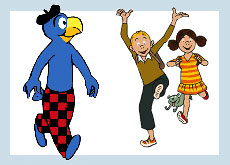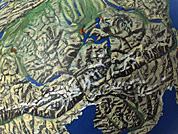Globi starts going global

A Swiss icon born in 1932 as an advertising symbol, a creature with a parrot's beak, blue body and red-and-black checked trousers, is spreading his wings.
Globi has long been a favourite with children in German-speaking Switzerland. He began as a mascot for the Globus department store, but over the years has spawned numerous spin-offs, the oldest of which are the comic adventure stories that still appear once a year.
On every double spread, the left hand page tells a tale in simple verse, while the right hand page consists of six illustrations.
Now one of his adventures has been published in English. Globi’s Trip Through Switzerland, is a translation of a book that first appeared in German in 1984.
The moving force behind the new venture is Corinne Aeberhard, a former journalist, who lived abroad for many years. Her young son took his Globi books with him wherever they went and showed them to his friends.
“I was always astonished at how well the figure went down,” Aeberhard told swissinfo.ch. But there was a problem: most of their friends didn’t speak German and needed the adventures explained.
Being convinced that Globi had an appeal for all children, not just Swiss ones, she approached the Globi publishers who were enthusiastic about the idea of an English version.
Translation challenge
The book was translated by Eric Mace-Tessler, the head of English at the International School of Berne and his wife, Margaret. The language may be simple, but translating it was not.
“English does not lend itself to short-line, rhyming couplets, and this form tends to require considerable inversion of normal word order, which is not really suitable for a children’s book,” Eric explained.
He did an initial translation. His wife would try to simplify it.
“When she had difficulty, we’d work together, tossing ideas back and forth,” he said. “Sometimes Globi rhymes would invade our sleep, as well.”
Globi’s mysterious appeal
The Mace-Tesslers are US citizens who only really got to know Globi when they did the translation.
“We are perhaps a little too old to become fans, not having the childhood memories of him that our Swiss neighbours have to make him endearing to us, but we can well understand what makes him attractive to young people,” said Eric.
The Mace-Tesslers’ experience is similar to that of Waltraut Bellwald, a cultural studies specialist at Zurich university who has written a book about the Globi phenomenon. She came originally from Germany and admitted to swissinfo.ch that when she first came across Globi, she found him very silly.
“But when I came to study him and his history, that gave me quite a different approach, and I realised I really like him – although I still find some of his adventures very plodding in a typically Swiss way. But via Globi I learned a lot about the Swiss – not culture or facts, more of a feeling of what they are about.”
Foreign adults may be bemused by his appeal, but as Bellwald pointed out, Swiss-German children get to know him at a very young age through parents and grandparents.
And Aeberhad warns against looking at children’s books through adult eyes.
Children see Globi having the kind of adventures they would like to have, she explained. And sometimes his ideas work, and sometimes they don’t – and when they don’t, that’s when he’s particularly funny.
For Eric Mace-Tessler, Globi has characteristics familiar to children anywhere.
“However, there are ways in which he is identifiably Swiss-German. Having lived in Bern for five years … has helped us to appreciate these,” he told swissinfo.ch.
“But children are far less obsessed with cultural differences, and I would imagine a American child, for example, would simply accept Globi’s “Swiss” qualities as Globi’s qualities.”
What next?
Aeberhard is bubbling over with plans for expanding the Globi English project. She is hoping to work with teachers to produce supplementary material for young English learners.
Each new annual edition will be translated – the 2010 adventure is already in preparation, and some of the classics will also be issued in English, she hopes.
The future depends on how well the first book sells: the Globi publishing house told swissinfo.ch that they had been pleasantly surprised by the response so far.
It looks as if Globi is on his way.
Julia Slater, swissinfo.ch
Globi was created as a mascot for the 25th anniversary of the Globus department store in 1932.
He was the brainchild of J.K. Schiele, head of advertising at Globus, and Robert Lips, an architecture student, who won a competition to design a suitable mascot.
Globi’s original role was to welcome children at a anniversary event. Since he had to speak, he was based on a parrot.
Initially Globi was simply a man dressed up in the costume; the first adventure appeared in 1933. Stories now appear annually.
The illustrations are black and white line drawings so that children can colour them in.
Globi, nicknamed “the children’s friend”, is sometimes selfless and sometimes selfish. Sometimes he does foolish or dangerous things. He has plenty of bright ideas – many of which go wrong.
In recent times he has become more politically correct and educational. Now some of the stories illustrate what happens behind the scenes at institutions like the post office or zoo.
The first French translation appeared in 1946; in 1947 Globi books were published in Brazil, Germany, Belgium, the Netherlands and Norway.
Globi met some resistance in the USA; US publishers wanted to add speech bubbles while Schiele insisted that Globi was not a comic. In 1948 the more upmarket Story Parade started publishing Globi adventures, with brief captions rather than verses. Story Parade folded in 1954.
The translation of Globi’s Trip Through Switzerland is the first attempt at an English rhyming version.
It is aimed at children aged between about 7 and 11.
It was tested on children at the International School of Berne, and had a first print run of 4,000.
Globi’s Trip Through Switzerland is published by the Globi Publishing House and costs SFr21.50 ($20.88).
It is a translation of Globis abenteuerliche Schweizer Reise, illustrated by Peter Heinzer with verses by Guido Strebel.
It costs SFr 21.50.

In compliance with the JTI standards
More: SWI swissinfo.ch certified by the Journalism Trust Initiative





You can find an overview of ongoing debates with our journalists here. Please join us!
If you want to start a conversation about a topic raised in this article or want to report factual errors, email us at english@swissinfo.ch.